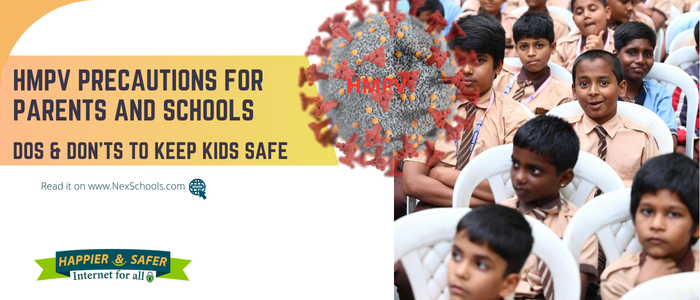
As schools are places where children spend significant time together, implementing preventive measures is essential to control the spread of Human Metapneumovirus (HMPV). Here are actionable steps schools and parents can take to ensure a safe and healthy environment.
What is Human Metapneumovirus (HMPV)?
Human Metapneumovirus (HMPV) is a respiratory virus that can cause a range of illnesses, from mild cold-like symptoms to severe lower respiratory tract infections, such as bronchiolitis and pneumonia. It is particularly concerning for infants, young children, and those with chronic respiratory conditions or weakened immune systems.
How HMPV Spreads?
HMPV is most likely transmitted through:
-
Respiratory Secretions: Coughing or sneezing by an infected person releases virus-laden droplets.
-
Close Personal Contact: Touching, hugging, or shaking hands with an infected individual.
-
Contaminated Surfaces: Touching objects or surfaces with the virus and then touching your mouth, nose, or eyes.
NexSchools understands schools that is why we have loaded many free benefits, insights and  ideas to boost enrollment.
ideas to boost enrollment.
Register Schools | Preschools
Do’s for Schools and Parents
Promote Proper Hand Hygiene
-
Teach children to wash their hands frequently with soap and water for at least 20 seconds.
-
Provide alcohol-based hand sanitizers in classrooms and common areas if soap and water are unavailable.
Encourage Social Distancing When Necessary
-
Reduce close contact between children during respiratory virus seasons.
-
Avoid large gatherings if there is an outbreak in the community or school.
Regularly Disinfect Surfaces
-
Clean and disinfect commonly touched surfaces such as desks, door handles, toys, and electronic devices daily.
-
Ensure proper cleaning protocols are followed in school facilities.
Read More
No YouTube, No Instagram - Is India Ready to Ban Social Media for Kids
Minimum Age Limits for Social Media Use Worldwide
CTRL Movie Review - Why Parents Should Be Worried
How Schools Get Involved With Cyber Safety Awareness Week
All You Need to Know About APAAR - A Guide for Parents
SCERT Delhi Organizes Training for ICT Teachers to Prepare for an AI-Driven Future
Boost Children’s Immunity
-
Encourage a healthy diet rich in fruits, vegetables, and other nutrients to enhance immunity.
-
Promote sufficient sleep and hydration to keep students energized and healthy.
Keep Sick Children at Home
-
Encourage parents to monitor their children for symptoms of illness. If a child exhibits signs like coughing, sneezing, or fever, they should stay home to recover and avoid spreading the infection.
Educate About Respiratory Etiquette
-
Teach children to cover their mouths and noses with a tissue or elbow when coughing or sneezing.
-
Dispose of used tissues immediately and wash hands afterward.
Educate About Respiratory Etiquette
-
Teach children to cover their mouths and noses with a tissue or elbow when coughing or sneezing.
-
Dispose of used tissues immediately and wash hands afterward.
Worried about AI, online threats, or screen time in your child’s life or school? Say goodbye to boring sessions! Now, learning is fun with interactive, character-based storytelling-Cyber Warrior Student Ambassador Courses.
Smarter DigiSafe With NexCia - Cyber Warrior Student Ambassador Course - 7 to 11 years
Don’ts for Schools and Parents
Don’t Overlook Symptoms
-
Be alert to symptoms such as wheezing, rapid or labored breathing, persistent high fever, fatigue, or dehydration. Seek medical attention if needed.
Don’t Allow Sharing of Personal Items
-
Discourage sharing of water bottles, utensils, towels, or toys to minimize the risk of virus transmission.
Don’t Skip Vaccinations
-
Ensure all students are up-to-date with recommended vaccinations to protect against other respiratory infections and reduce complications.
Don’t Delay Communication
-
Schools should communicate promptly with parents if there are cases of HMPV or other respiratory illnesses in the community.
Additional Recommendations from WHO
The World Health Organization (WHO) emphasizes the following steps for managing HMPV risk:
-
Hand Hygiene: Wash hands frequently with soap and water or use hand sanitizers.
-
Respiratory Etiquette: Cover mouth and nose with a tissue or elbow when coughing or sneezing.
-
Environmental Cleaning: Regularly disinfect high-touch surfaces and shared items.
-
Avoid Close Contact: Maintain distance from individuals showing signs of respiratory illness.
-
Stay Informed: Follow updates from health authorities and WHO for evolving guidelines
Disclaimer
The information provided here is sourced from the World Health Organization (WHO) and the Centers for Disease Control and Prevention (CDC). It is intended for informational purposes only. Please seek medical advice from healthcare professionals for any health-related concerns or conditions.
Register as a member
Schools, Children, Youth & Parents Membership of NexSchools comes loaded with many free benefits, insights and  ideas
ideas
Contribute Stories Out of Schools - Free
Source:
World Health Organization: Disease Outbreak News - HMPV
https://www.cdc.gov/human-metapneumovirus/about/index.html
India Today
www.cdc.gov
Keywords: Keeping Kids Healthy and Safe from HMPV Spread | School Guideline to Keep children Safe from HMPV Virus Spread | Principals | Teachers | Mothers
Register as a school member
School Membership of NexSchools comes loaded with many free benefits, insights and  ideas
ideas